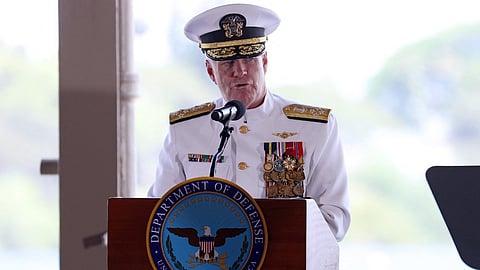
- NEWS
- the EDIT
- COMMENTARY
- BUSINESS
- LIFE
- SHOW
- ACTION
- GLOBAL GOALS
- SNAPS
- DYARYO TIRADA
- MORE

BAGUIO CITY—Armed Forces of the Philippines chief General Romeo Brawner Jr. lamented that the country has been facing “an evolution in military affairs and security,” and therefore, the Manila-Washington 73-year-old Mutual Defense Treaty (MDT) must also be dynamic.
Brawner made these remarks at a press conference in Baguio City, following recent calls for a comprehensive review of the MDT in light of the evolving security landscape and the increasing challenges faced by the country in the West Philippine Sea.
“The treaty was signed in 1951, and from that time until now, there has been an evolution of military affairs, even the threats have evolved—we now see different kinds of attacks, not just kinetic or the usual military invasion that we saw during the Second World War,” Brawner said.
Defense Secretary Gilberto Teodoro Jr. earlier mentioned that there’s an ongoing discussion as to broadening the interpretation of this defense pact.
“There are ongoing conversations so not to broaden the scope of the MDT but to broaden interpretations to make it more dynamic and not to fall into China's trap of canalizing,” he said
Brawner maintained the review of the MDT should be tackled by higher-ups.
“So we believe that the treaty has to be dynamic as well, but then again, we would like to emphasize that this is a political matter that has to be settled by our political leadership,” Brawner said.
National Maritime Council spokesperson Alexander Lopez also noted there’s a need to consider the MDT review amid the consistent changes in the security landscape.
“For me, that MDT was established in 1995 and since then the strategic landscape has changed so much, so maybe it's high time now to make the review… [it] may be relevant to the new security challenges,” he said.
The Philippines has been filing diplomatic protests against Beijing over the Coast Guard’s series of “dangerous maneuvers and harassment incidents” against Philippine vessels “legitimately operating” in the WPS.
The US has repeatedly reaffirmed that the MDT covers armed attacks on Philippine armed forces, public vessels, or aircraft – including those of its Coast Guard – anywhere in the South China Sea (SCS).
For his part, US Indo-Pacific Command chief Admiral Samuel Paparo pointed out that the militaries of both countries are just instruments in preparing the options to prevent armed attack.
“I think that armed attack is not a legal definition necessarily, I think it's a diplomatic definition, and I also think that it's a question—General Brawner and I are in uniform, and we are instruments of policy and not makers of policy,” he said.
“So, A, I think that it's a diplomatic definition and not necessarily a legal definition, and my job is to prepare options, if so called, and number two, I'm an instrument of those options,” he added.
